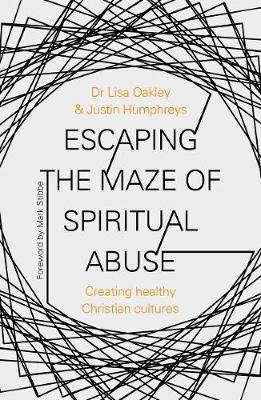Escaping the Maze of Spiritual Abuse

Escaping the Maze of Spiritual Abuse
Through a combination of extensive research, years of hands-on experience through the work of thirtyone:eight (formerly CCPAS), and individual testimonies, Oakley and Humphreys describe clearly the nature of spiritual abuse, and the best ways of countering it.
Understanding the characteristics of spiritual abuse is important simply so we can recognise it, but it is also the first step in allowing those who have experienced it to have their stories acknowledged. So, what are we looking for? Quotes from those who have experienced spiritual abuse help to explore the key features of this form of abuse.
What is the impact of spiritual abuse on individuals, including the effect on the personal faith journeys of individuals and their sense of self? The authors detail the challenges faced in responding well to stories of spiritual abuse and draw on recent research where those who have experienced this offer suggestions for the best ways to respond to personal accounts.
A road to recovery is possible. The journey through spiritual abuse is painful, and for many there is not a `quick fix' to recovery. Oakley and Humphreys explore how people have found their way to a positive outcome and the factors that make this more likely. They suggest how churches can support those who have had this experience.
How do we prevent spiritual abuse in the first place? The authors explore the role of leadership in creating safer places as a preventative measure, and in creating clear opportunities for effective learning. What is the relationship between theological ideas and justifications for harmful behaviours? Effective communication plays a vital part in both good and bad leadership styles: how can leaders create opportunities for spiritual and emotional flourishing?
Good health requires safety. What does a "safer" culture look like and how does this establish healthier contexts to work and worship i
PRP: 99.14 Lei
Acesta este Prețul Recomandat de Producător. Prețul de vânzare al produsului este afișat mai jos.
89.23Lei
89.23Lei
99.14 LeiLivrare in 2-4 saptamani
Descrierea produsului
Through a combination of extensive research, years of hands-on experience through the work of thirtyone:eight (formerly CCPAS), and individual testimonies, Oakley and Humphreys describe clearly the nature of spiritual abuse, and the best ways of countering it.
Understanding the characteristics of spiritual abuse is important simply so we can recognise it, but it is also the first step in allowing those who have experienced it to have their stories acknowledged. So, what are we looking for? Quotes from those who have experienced spiritual abuse help to explore the key features of this form of abuse.
What is the impact of spiritual abuse on individuals, including the effect on the personal faith journeys of individuals and their sense of self? The authors detail the challenges faced in responding well to stories of spiritual abuse and draw on recent research where those who have experienced this offer suggestions for the best ways to respond to personal accounts.
A road to recovery is possible. The journey through spiritual abuse is painful, and for many there is not a `quick fix' to recovery. Oakley and Humphreys explore how people have found their way to a positive outcome and the factors that make this more likely. They suggest how churches can support those who have had this experience.
How do we prevent spiritual abuse in the first place? The authors explore the role of leadership in creating safer places as a preventative measure, and in creating clear opportunities for effective learning. What is the relationship between theological ideas and justifications for harmful behaviours? Effective communication plays a vital part in both good and bad leadership styles: how can leaders create opportunities for spiritual and emotional flourishing?
Good health requires safety. What does a "safer" culture look like and how does this establish healthier contexts to work and worship i
Detaliile produsului










